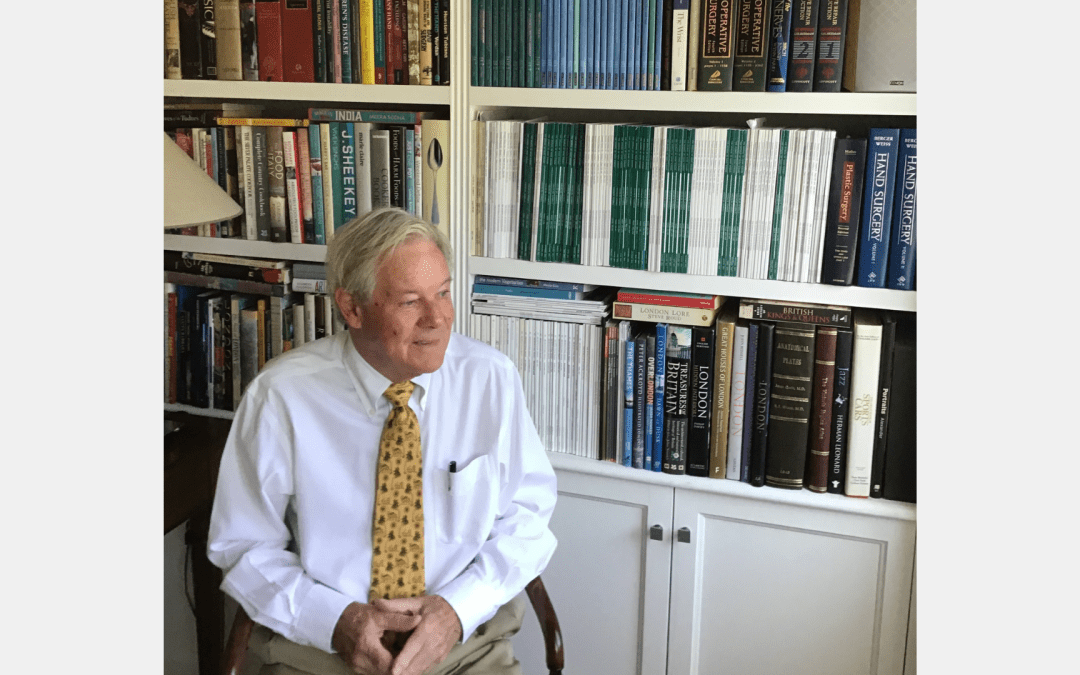We are saddened to announce the death of our trustee and colleague, Ian Winspur, who gave invaluable expertise and wisdom to BAPAM and our patients over many years. As an expert hand surgeon specialising in the care of musicians, Ian was a leader in the development of performing arts medicine as a specialism, and a resolute supporter of our organisation. His care for our patients enabled many performers to overcome injury and continue thriving careers. He was committed to sharing knowledge with practitioner colleagues. With Kit Wynn Parry, Ian co-authored the landmark book “The Musician’s Hand” and with Mike Shipley, was integral to the development of the Performing Arts Medicine programme at UCL.
We are grateful to the British Society for Surgery of the Hand for permission to reproduce Katherine Butler’s obituary for Ian from the BSSH website: https://www.bssh.ac.uk/about/news/276/ian_winspur_orbituary.
Ian Winspur
b. 30.04.1944 d. 15.06.2024
FRCS Ed FACS LLM
Ian Winspur, a luminary in the field of hand surgery, championed the care of musicians’ hands. Graduating from Edinburgh Medical School in 1969, he completed his internship in Denver, Colorado. Returning to England in 1970, he joined the Royal Air Force, trained as a Plastic Surgeon, and earned his FRCS. He served six months in a mobile Army surgical hospital in Oman. In 1975, he went back to Colorado to train in hand surgery and settled in Santa Barbara in 1981, where he worked exclusively as a hand surgeon. There, he encountered musicians and devoted himself to understanding and treating their unique needs.
At the time, there was a lack of literature addressing the relationship between musicians and hand surgery. Hand surgeons often dismissed musicians as neurotic and hypochondriacal, failing to comprehend their language and concerns. Ian recognised the complexity of musicians’ hand and arm problems, emphasising that most surgeries result from incidental trauma. He believed in exhausting all other treatment options before resorting to surgery, which should only be considered when it directly interferes with playing. Ian stressed that appropriate surgical intervention, performed correctly, for the right reasons, and followed by instrument-focused hand therapy, would not end a musician’s career.
He emphasised the importance of meticulous preoperative planning, focusing on precise incision locations, anatomical repair, and adjustments to address anticipated anatomical compromise or stiffness specific to the musician’s instrument and playing style. An early return to playing was crucial. He reported that only a small percentage of musicians presenting with recognisable orthopaedic or rheumatological conditions in the upper limb are candidates for surgery.
After returning to the UK in 1994, he earned his LLM from Cardiff University Law School and established The Hand Clinic at Devonshire Hospital in London, where he primarily treated musicians. He collaborated with Dr. Christopher (Kit) Wynn Parry, a renowned consultant rheumatologist, to publish “The Musician’s Hand: A Clinician’s Guide” in 1998. This landmark book, the first in English on the subject, aimed to educate doctors, therapists, musicians, and music teachers about the medical and surgical care of musicians’ hands and the need for a multidisciplinary approach, considering musicians’ lifestyle, temperament, and psyche. Ian revised many chapters of this book, and the second edition was published in 2018.
Ian was actively involved with the British Association for Performing Arts Medicine (BAPAM), a charity established in 1984 to address the gap in care for musicians, many of whom faced limited financial resources. BAPAM provides medical advice and care to performers and continues its vital work today. Ian joined BAPAM’s Board in 2008 and contributed to its Medical Committee’s Training Steering Group and Research Advisory Group.
Encouraged by Kit, Ian and Dr. Michael Shipley (Consultant Rheumatologist) developed a unique MSc in Performing Arts Medicine at University College London (UCL), which launched in September 2011 and is ongoing. This programme offers an extensive curriculum that covers the prevention, diagnosis, and treatment of ailments affecting musicians and other performers. The course has consistently drawn students from across the globe, making substantial contributions to the discipline of performing arts medicine.
Ian established and developed the specialist role of a hand surgeon in performing arts medicine. He emphasised a multidisciplinary approach to prevention, assessment, and treatment of musicians’ specific needs, avoiding surgery when possible. When surgery was necessary, he focused on careful consultation and planning with the musician and an instrument-focused approach to rehabilitation.
Ian’s commitment to musicians was unwavering. He believed that music is everything and without it, life would be less full. His absence will be deeply felt.
Ian is survived by his beloved wife Ingrid, daughter Michelle and grandson Christopher.
Katherine Butler
B.Ap(Sc)OT, AHT(BAHT), A.Mus.A(Flute)
Clinical Specialist in Hand Therapy
London Hand Therapy
After studying occupational therapy and flute performance and working in both fields, I decided to specialise in performing arts medicine. When “The Musician’s Hand: A Clinician’s Guide” was released in 1998, I was so captivated that I read it three times consecutively. Thanks to a scholarship from the Queen’s Trust, I moved from Australia to London in 1998, where I was honoured to work with both Ian Winspur and Kit Wynn Parry. My association and friendship with Ian lasted more than 25 years and I am deeply grateful to him for the influence he had on my life and career.

